- Home
- Jeannie Wycherley
Crone Page 4
Crone Read online
Page 4
“Did you see me with it?” I asked her. She shook her head and shrugged again. Her gaze was steady, if anything she appeared curious about me and my reactions.
A sudden realisation crossed my mind and I shook my head fiercely. “Look, I’m not crazy.”
I wasn’t, was I? A wave of anxiety flooded through me. What was happening to me? Was I becoming unhinged? Or had I really seen an eyeball? Panic made me babble, suddenly the tears were falling.
Claire’s hand was on my shoulder. “Easy,” she soothed. “It’s the shock. Drink the tea.”
I drank the tea, my head full of memories. I wept. The floodgates opened. I sobbed for Max. For James. And for Euan who had survived but with life-changing injuries. And for the latest car full of reckless kids. I cried for myself. Time passed. Claire was kind. She spoke soothing words, plied me with the yellow tea, and handed me tissues.
*
A few hours later I was standing in my own hall and Pip was rising stiffly from his basket in the kitchen. My left hand was bound up and throbbing nicely, my car was parked on the road directly outside, and my keys lay on the little telephone table where they always lived when I was at home. The thing was, I couldn’t remember driving home. I had no memory of negotiating the winding lanes or busy streets of Abbots Cromleigh. I didn’t recall parking, or dropping my keys in their habitual place.
I felt drained. My head pounded. I let Pip into the back garden before feeding him, then climbed the stairs to drop on my bed like a stone and sleep like the dead.
I slept more soundly than I had in months, years maybe. A full eleven hours. Pip usually stirred for a morning wee at around 6.30 but today at 8 he was still curled in his basket, snoring contentedly. I woke slowly, warm and comfortable under the covers. When I rolled over to check the time I found myself tangled in the bandage that Claire had wrapped around my hand. I sat up and pulled at the rest of the dressing gingerly, afraid of what I would find underneath. I fully expected a congealed, icky mess of blood, but the bandage fell away easily from the dried green paste that covered the wound. There was no mess.
I swung out of bed and padded through to the bathroom where the sun was streaming through the frosted glass. Holding my hand up to the light, I examined the dry paste and picked at the edges with my thumbnail. It crumbled away like chalk. I gently picked a little more and then rubbed harder with my fingers. Dust coated the sink in lurid powder. There was no evidence of the laceration from yesterday under the dry paste. I washed my hands with soap and water until they glowed pink and then towelled them dry. I could see the faintest pink line across the palm of my hand.
Nothing more.
*
Over the next few weeks, in idle moments, I found myself looking at the palm of my hand in wonder. I decided to visit Claire again and ask her about the wound.
This time I approached her cottage clutching a bottle of wine and feeling strangely nervous. I didn’t know what she would say to me, but I sensed we had unfinished business.
A number of crows, pulling at the innards of some unfortunate roadkill victim, fluttered reluctantly away from me as I walked down the lane towards them. Others sat on branches and stared at me insolently.
The cottage door opened as I bent to unlatch the gate. Claire waited for me, not exactly smiling but seemingly not too displeased. Once in the kitchen, it became apparent she had been expecting company. This time a green teapot and two pretty mugs waited for the kettle to finish boiling. I handed my wine over awkwardly. “Sorry, I don’t know whether you drink wine, but I just,” I stumbled over the words, “I just wanted to say thank you. For last time.”
Claire took the wine. She studied the label for a second, her head bent over the bottle, her hair tied back in a loose bun with little curls falling over the nape of her neck. Her hair had an amazing sheen. She smiled graciously. “Thank you. I’ll enjoy this.” She placed the bottle on a shelf on the dresser at the rear of the kitchen. “But you really didn’t have to, you know.”
“I know.” I hesitated. “I guess…”
“You wanted to come back.”
“Yes.”
She nodded and indicated a chair.
“If you’re expecting somebody I’ll leave you to it.” Claire shot me a puzzled glance, so I indicated the mugs and the teapot standing ready.
“Ah. No. I expected you.”
I frowned. She’d said that last time.
I watched her bustle around, filling the pot and rattling the mugs. She offered me honey to stir into my tea. “You should,” she said when it appeared I would decline. “It really brings out the taste and the honey is from our own hive.” I took the honeypot from her and stirred some in. She was right. It tasted glorious.
We made a little small talk before lapsing into silence. I felt I should ask her about the wound on my hand she had treated but didn’t know how to start.
Claire may have sensed my discomfort but she ignored it. Instead she rose and removed a candle from a drawer. She lit the candle with a taper from the stove and stood in front of a mirror. I hadn’t noticed the mirror before, it was covered in a thin green silk scarf that blended in with all the plants—the drying herbs, flowers, and vegetables hanging from the ceiling. In fact, I hadn’t noticed the décor at all during my previous visit. I had obviously been too busy bleeding and crying.
I looked around now. The room was basic, with rough-hewn walls and a neatly laid stone floor, with furniture that was original and rustic. People would pay a fortune for such furniture these days and yet the solid table and chairs, the dresser and free-standing cupboards appeared to have been in situ for a very long time. Everything was spotlessly clean. A homemade lissom broom rested idly in the corner waiting to be pressed into service.
Claire carefully removed the silk scarf from the mirror and folded it. The wooden frame was ornately carved to resemble a huge knot in a tree with the mirror at its centre. At its north, south, east, and west points there were clusters of leaves and acorns, berries and blossoms.
Claire held the candle in front of the mirror. The flame flickered and burned brightly for several seconds, leaping towards her reflection before she blew it out. The sooty black smoke twirled in the air, clouding the mirror. Claire stared intently through the swirls, looking deep into the glass. When the final wisps cleared, Claire turned back to me.
“I knew you were coming because I have the sight.”
“The sight?”
“I can see things that … most others can’t.”
“What sort of things?” I tried to suspend the disbelief from my voice.
“All sorts of things. Things that have happened. Things that will happen. I know that you and I are going to become good friends. I know we’re going to work together towards a common aim.”
I sat back in my chair and pursed my lips. Did she think I was a fool? I stared around the room suspiciously, studied the mirror again and the strangely dated items that cluttered the shelves and hung from the ceiling. Coloured bottles and labelled jars were everywhere. “You know this how?”
“I know, because I’m a witch,” said Claire simply.
“Oh yes?” I answered politely. Hello, said my 42-year-old brain, No such thing, no such thing! I was not a great believer in the occult or anything remotely similar. Hell, I hadn’t even read any Harry Potter books, although I’d watched a few of the films.
“Yes.” Her cool grey eyes fixed me to my chair. There was no challenge in them. She merely wanted me to know and to understand. “There is such a thing.” She offered me a slightly amused smile. Perhaps she had read my mind.
Maybe.
No.
It was obvious what I was thinking and she had guessed correctly.
“My mother is a witch, as is my grandmother, and the knowledge and the wisdom they’ve accumulated has been handed down through generations. I’m an only daughter.”
“Claire isn’t a very witchy name, is it?” I was abrupt, slightly rude. “Shouldn’t you be called Agnes or Griselda or Gertrude or something?”
She laughed warmly. “No it isn’t very witchy, that’s true. But Claire is just one of my given names. Perhaps Griselda is another.” She twinkled at me.
I frowned. She seemed serious. I took a moment. “So, the healing of my hand? That was what? Magic? And my getting home? I couldn’t figure that out.”
“A kind of magick, if you like, yes.” Claire didn’t add anything else. She twisted her mug in her hands and stared into the depths of her tea.
My own green mug was dangling loosely in my hand. I knew nothing about magic or spells or the sight. In fact, my only brush with the occult came about when a friend showed me a love spell when I was thirteen. I wrote the name of my true love on a piece of paper in my untidy scrawl and slept with it under my pillow for a week until my mum changed my bed and it was washed with the bedlinen. It hadn’t made poor Ian Todd fall in love with me though.
This was hocus-pocus nonsense. Why would Claire tell me? Surely if witches were real they kept schtum. “Why do I need to know? You could have just bound up my hand and sent me on my way. You didn’t have to put that gooey green stuff on it. I don’t have to know what … who … you are.”
“It’s not my choice. You do need to know who I am, apparently, because you are going to need my help. And we are going to need yours.”
“I’m going to need your help? What do I need your help for?”
“Maybe not right now, but you will,” Claire answered calmly.
“To do what?” I challenged.
“I can’t tell you that yet. You will come to me of your own free will when the time is right.”
I gawped at Claire. She really believed what she was saying.
There was a creaking from upstairs that startled me. We weren’t alone. Claire glanced up at the ceiling and smiled. “I’m sorry. You’ll have to go now. That’s my grandmother.” For some reason the thought of Claire’s matriarchal witchy grandmother hovering above my head, able to hear every word we were saying, perturbed me more than a little. I had assumed we were alone.
I rose and walked to the front door of the cottage. I noticed the entrance to the living room here, beyond which a fire burned brightly in spite of the warmth of the day. Several rocking chairs were angled close to the fire, one covered by a patchwork blanket. A cat, black of course, sat dangerously close to the grate. As I took in the room and its contents, a crow landed on the sill of the open window. I started in alarm.
“Volare procul,” ordered Claire, and the crow squawked almost angrily at her before flying away.
At the front door I hesitated, turning back to Claire.
I was incapable of thinking of anything to say that seemed to fit the odd conversation we’d shared. “Thanks again,” I said. It was all I could manage.
“Thank you for the wine. I’ll see you soon.” She smiled and closed the door.
Five
Ethan
Ethan Carnegie consulted his map once more. This appeared to be the correct route. If he cut through the field he would come out on a tiny B road called … where was it … oh yes, Elbury Road. That was perfect. From there it was a seven-mile hike into Elbury and he would pass by The Traveller’s Rest, an inn which had received four stars on TripAdvisor and which Ethan felt warranted a visit. He intended to have a spot of lunch before hiking on to the coast.
This was his third weekend in succession in Devon, and he was enjoying walking along the Jurassic coast. He was recently divorced and fighting fit. Everything felt good in his world.
He tramped down Pitcher’s Field spying a sweet little cottage off to his right. Even in the warmth of the summer sun, the chimney was emitting smoke. He admired the cottage, then climbed the stile that led to the road. He hadn’t gone much further when he spotted a woman up ahead of him. In spite of the sun, he shivered, goose bumps appearing on his skin. He rubbed his hands together to get rid of the prickling sensation and dismissed his feeling of unease.
The woman was leaning against a huge tree at the side of the road, wearing khaki shorts and a cheerful yellow t-shirt. She was slim and sporty looking with boyish hips. Her ash blonde hair, straight as a rule, was pulled back in a tidy ponytail. She balanced on one foot, a walking boot lying in the road next to her rucksack, while she pulled at a yellow sock.
“Hi there,” he said breezily as he came alongside her. “Everything ok?”
Her pale green eyes flashed in the sun. Ethan was struck by the woman’s skin, so clear and glowing with health. He smiled appreciatively.
“Good afternoon,” she said. “Yes, everything’s fine. I had a stone in my boot and seem to have cut my foot, but I’ll live.”
Ethan indicated her sock. “Would you like me to take a look? I have a first aid kit in my rucksack.”
“Oh I really don’t want to be any bother,” the woman murmured casting her eyes down.
“It’s no bother, I promise.” Ethan set down his own rucksack and flipped open one of the side flaps but got no further.
“No, I suppose not,” the woman said.
Ethan glanced up. The woman’s eyes were dead. She smiled and lashed out at him.
*
From the familiarity of the kitchen table I examined accident photos in the local newspaper. Abbotts Cromleigh buzzed with the news of the death of the walker on Elbury Road, and while the police initially appealed for witnesses and information, it soon became clear that nobody knew anything. Nothing helpful anyway.
The Cromleigh Chronicle identified the man as Ethan Carnegie, divorced and from Reading, Berkshire. He had been a keen walker. Although police didn’t give away many details they had announced that they were treating the death as suspicious and were considering whether the walker had been in collision with a vehicle of some description.
Results of the post mortem were of limited assistance. The man had suffered catastrophic head injuries, a broken wrist, and a broken rib. A collision with a vehicle seemed the only rational explanation. Officially.
The problem remained: there were no skid or brake marks on the road, suggesting that if there had been a vehicle it had made no effort to stop. The absence of debris indicated that any vehicle had suffered no cataclysmic damage itself. It was a complete mystery. Police enquiries in the vicinity of Elbury and Abbotts Cromleigh regarding vehicles with dents or broken windows or headlights had drawn a blank.
I supped my tea and studied the image in front of me. The photographer had taken the photo pointing up the hill towards Abbotts Cromleigh. In the near distance, slightly out of focus, not one hundred metres from the scene of the walker’s accident I could see the oak tree, Max’s tree, surrounded by withered floral tributes.
I sat forwards over the paper, elbows on the table, and rubbed my face. This was such an unlucky stretch of road. All of these accidents and all of these deaths. Surely they could be prevented in some way? Perhaps it would help to have more signposts about the bend, or to slow the traffic right down in the area opposite Claire’s cottage.
I played back the road in my head. Elbury Road was a typical Devon lane, curving this way and that way, climbing and dropping, tall hedges on both sides. The odd thing to me, was that visibility was actually pretty good on this stretch and the road was relatively straight. Obviously driving too quickly and meeting something in the road would cause problems, but otherwise there was no particular reason for this to be an accident black spot. The oak tree itself did not obscure the road ahead.
I knew all this thanks in large part to the police report into Max’s death and his inquest. The experts had concluded that speed had not been a factor in the accident, but that James had lost control of the vehicle due to a lapse of concentration caused by circumstances unknown. It was unclear why James had failed to apply his brakes.
Very little had made sense about Max’s accident, and nothing made sense about this walker’s death. For me it was all too emotive, and somewhere a family must be grieving just as I had. Just as I was. All these wasted lives. So many families wanting answers. We were all waiting for something indefinable.
*
Later that afternoon I sat in a café in Abbotts Cromleigh stirring a cup of tea. Feeling unsettled, I’d decided to speak to my old family liaison officer, DC Ivy Lawrence, about the accidents on Elbury Road. I’d phoned her on the off chance she had some free time and could chat. When she walked into the café, I did a double take. Ivy was dressed in civvies and was very pregnant. I had no idea.
“Wow!” I said in greeting, my eyes getting wide.
She smiled, and I stood up to give her a hug. It was difficult to reach around her.
“I didn’t know you were on leave,” I apologised.
She laughed and then scolded me. “I haven’t seen you for ages! How are you doing?” Her eyes were wise, and I sensed the warmth of her concern and the compassion that made her so good at her job. Ivy had spent a great deal of time with me after Max’s accident even though, in the end, Max had not been a victim of crime and nobody had been found to be at fault. I waited while Ivy ordered a milk shake. She had a craving for strawberries.
“I’m ok,” I said, my standard response. We both laughed. “No, I am, really. Well I think I am. You know. Some things rock the boat.”
Ivy nodded. “The recent accident down Elbury Road? I thought of you.”
“Yes.” The image of the eyeball came back to me in a flash, and I shuddered. I hesitated and frowned. “Yes. That’s what I wanted to ask you about.”
Ivy smiled and shook her head. “I haven’t been working with those families, and I don’t really know all of the details.” I felt this was only a half truth. Just because Ivy wasn’t involved didn’t mean she didn’t have her ear to the ground.
“Do they have a cause for the accident yet?”
Ivy took a beat and narrowed her eyes. “Driver error.” Of course. “Were you expecting something else?”

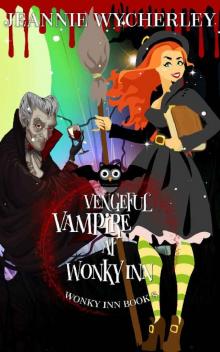 Vengeful Vampire at Wonky Inn: Wonky Inn Book 8
Vengeful Vampire at Wonky Inn: Wonky Inn Book 8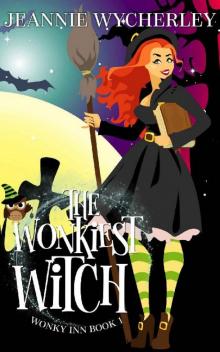 The Wonkiest Witch
The Wonkiest Witch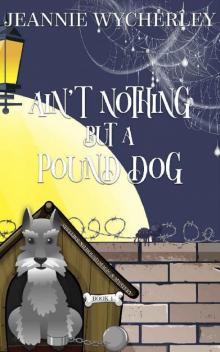 Ain't Nothing but a Pound Dog
Ain't Nothing but a Pound Dog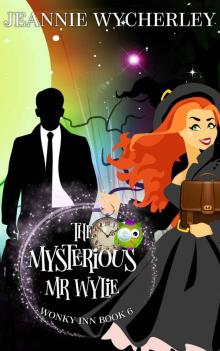 The Mysterious Mr Wylie: Wonky Inn Book 6
The Mysterious Mr Wylie: Wonky Inn Book 6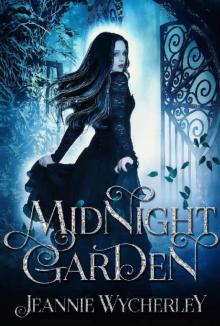 Midnight Garden
Midnight Garden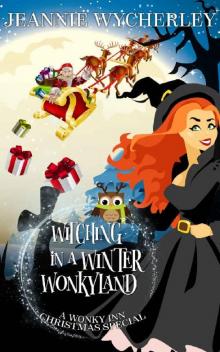 Witching in a Winter Wonkyland: A Wonky Inn Christmas Cozy Mystery
Witching in a Winter Wonkyland: A Wonky Inn Christmas Cozy Mystery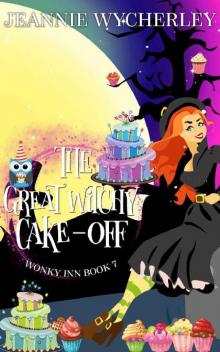 The Great Witchy Cake-Off
The Great Witchy Cake-Off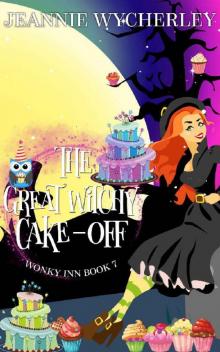 The Great Witchy Cake Off: Wonky Inn Book 7
The Great Witchy Cake Off: Wonky Inn Book 7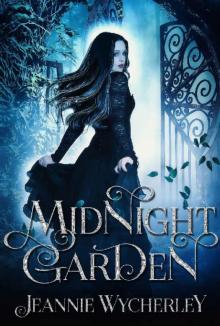 Midnight Garden (The Extra Ordinary World Novella Series Book 1)
Midnight Garden (The Extra Ordinary World Novella Series Book 1)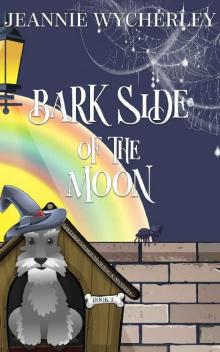 Bark Side of the Moon: A Paranormal Animal Cozy Mystery (Spellbound Hound Magic and Mystery Book 3)
Bark Side of the Moon: A Paranormal Animal Cozy Mystery (Spellbound Hound Magic and Mystery Book 3)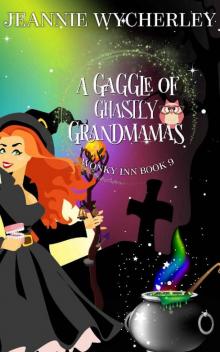 A Gaggle of Ghastly Grandmamas: Wonky Inn Book 9
A Gaggle of Ghastly Grandmamas: Wonky Inn Book 9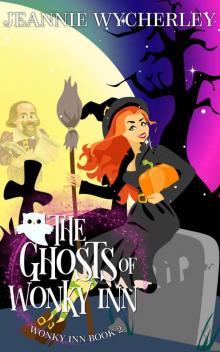 The Ghosts of Wonky Inn: Wonky Inn Book 2
The Ghosts of Wonky Inn: Wonky Inn Book 2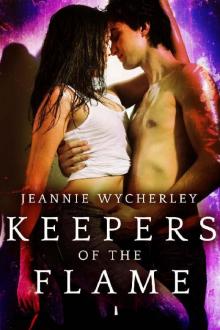 Keepers of the Flame: A love story
Keepers of the Flame: A love story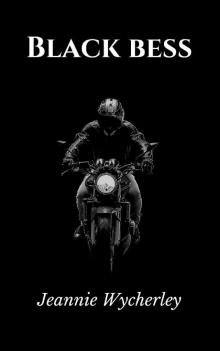 Black Bess
Black Bess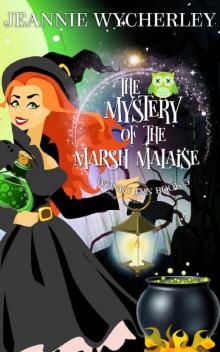 The Mystery of the Marsh Malaise: Wonky Inn Book 5
The Mystery of the Marsh Malaise: Wonky Inn Book 5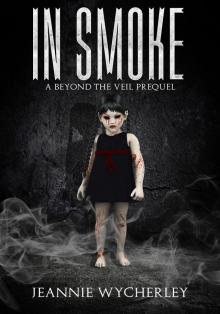 In Smoke eBook ready
In Smoke eBook ready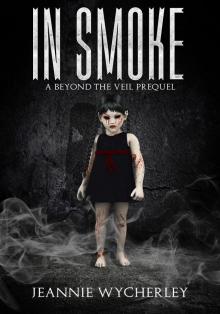 In Smoke
In Smoke